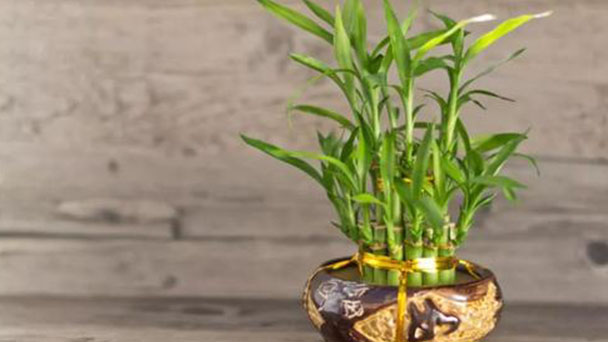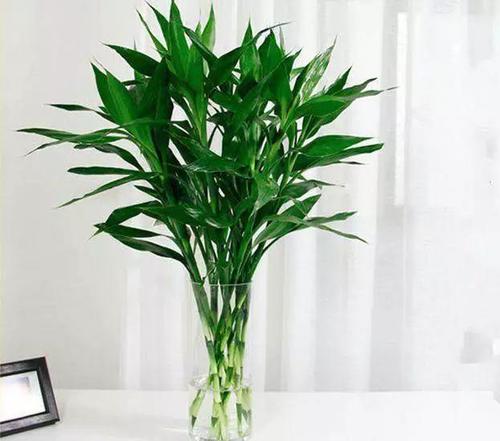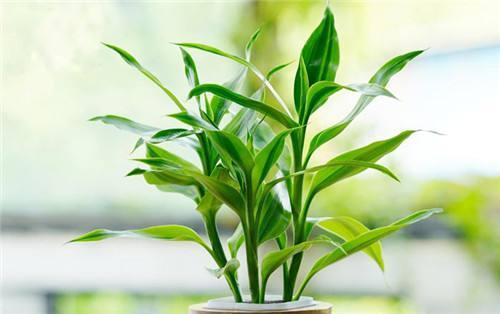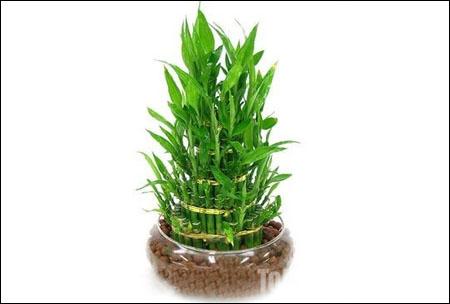How to care for the Lucky Bamboo
Written by Maggie
Oct 18 2021

When growing Lucky bamboo in water, if you find the yellow leaves of Lucky bamboo, cut them off in time. After you trim them, apply some medicine to the wound to disinfect it. After that, change the water of the plant. The yellow leaves of the Lucky Bamboo may also be caused by too much light. At this time, it is necessary to promptly move the plants to the semi-shade for cultivation.
The main reason for the dry tip of Lucky Bamboo is improper maintenance. If the water quality is poor, it is necessary to change water for plants in time, trim rotten roots, and increase the number of times to change water during summer. If the light is too strong, please move the Lucky Bamboo to a cool and ventilated place. If the fertilizer is insufficient, please replenish the fertilizer to the plants in time.

Lucky Bamboo - one of the best indoor trees
How to care for yellow Lucky Bamboo leaves in hydroponic culture
Lucky Bamboo (Dracaena sanderiana), also known as longevity bamboo, is a small perennial evergreen tree of the Agave family. It is often used as an ornamental potted plant. Some people may ask what to do about the yellow leaves of the Lucky Bamboo. Lucky Bamboo yellowing should be cut off in time, you can use the method of light clipping when pruning.
After pruning, it can be properly applied to the wound to disinfect, which can speed up the recovery of wounds and help the growth of plants. Lucky Bamboo turns yellow when the water is not changed in time. It is better to change water every two days when breeding Lucky Bamboo. Cover the roots of the plants with water every time.
Lucky Bamboo has higher requirements on water quality, so you can change pure water and clean tap water for plants. These two kinds of water impurities and bacteria are less, which is conducive to the growth of plants. The yellow leaves of the Lucky Bamboo may also be caused by too much light. In this case, it is necessary to transplant plants to the indoor semi-dark and ventilated environment.
Lucky Bamboo is a light-liking plant. It can be put in a sunny environment at ordinary times. In summer, it is better to put the plants in a semi-cloudy environment to receive astigmatism irradiation.When breeding Lucky Bamboo, proper nutrient solution should be dropped into water to replenish nutrients for plants.

Lucky Bamboo is one of the plants that can grow in water
How to care for Lucky Bamboo tip leaves dry in hydroponic culture
1. Change the water regularly for Lucky Bamboo
Lucky Bamboo is perennial green, a common ornamental plant in the family. Hydroponic lucky bamboo maintenance is easy, and ornamental value is high. During curing, if the water is not changed in time, the blade tip of Lucky Bamboo will dry up. You can cut off the withered leaves. After pruning, the water should be changed to Lucky Bamboo, and later curing can be changed once every 3 ~ 5 days, and once every 2 ~ 3 days in summer.
2. Reduce light for Lucky Bamboo
Lucky Bamboo hydroponic culture does not require much illumination, so it can be conserved in a well-lit and ventilated environment. The tip of the Lucky bamboo will dry up after the hot summer sun shines on it. If the light is too strong, please move the Lucky bamboo to a warm and ventilated position. Later curing can avoid the strong midday light and give the plants more light.
3. Fertilizer supplement for Lucky Bamboo
During the growth period of Lucky Bamboo (Dracaena sanderiana), sufficient fertilizer is needed. If the fertilizer is insufficient, the tip of the leaf will dry up and turn yellow. If the nutrition of Lucky Bamboo is insufficient, it is necessary to supplement fertilizer to the plants timely. During the period of water change, a proper amount of nutrient solution or thin fertilizer can be added to the water to provide nutrients for the Lucky bamboo root system and the growth of its branches and leaves.
4. Trim the roots for Lucky Bamboo
The withered tip of the Lucky bamboo may also be caused by more rotten roots. During the curing period, the water of the Lucky bamboo should be changed regularly, and the rotten roots of the plants should be trimmed. If more roots rot in the vase, they need to promptly clean the root, but also clean and disinfect the vase. After disinfection, it can be put into clean water, which is conducive to the growth of Lucky bamboo root system.

Read Next: Lucky Bamboo (Dracaena Sanderiana) Grow & Care Guide
Latest Updated
- Benefits of Bugleweed - 7 Science-backed Health Benefits
- Bugleweed Dangers & Side Effects - Is It Poisonous?
- How to Plant Evergreen Trees - What You Should Know
- When to Plant Evergreens - Grow Guide for Evergreen Trees
- 12 Wonderful Evergreen Shrubs for Your Garden
- 12 Popular Evergreen Plants with Pictures for Beginners
- When And How To Prune A Lilac Bush Like a Pro
- How to Grow & Care for Lilac Vine (Hardenbergia Violacea)
- Japanese Lilac Tree (Syringa Reticulata) Care & Propagation Guide
- Shumard Oak Pros and Cons - What to Know
Popular Articles
- Winter maintenance of Antirrhinum Majus
- How to Grow Terminalia Mantaly Tree
- How to Grow and Care for Crossostephium Chinense
- How to grow Antirrhinum Majus in spring
- Peristeria Elata (Dove Orchid) Profile: Info & Care Guide
- Underwatered Snake Plant (Sansevieria Trifasciata) - Signs And How To Fix
- How to Care for Brazilian Jasmine Plant (Mandevilla Sanderi)
- How to Grow & Care for Graptopetalum Purple Delight in Summer
- Rosa Chinensis (China Rose): Plant Growing & Care Tips
- How to Care for Baby Sun Rose (Aptenia Cordifolia)